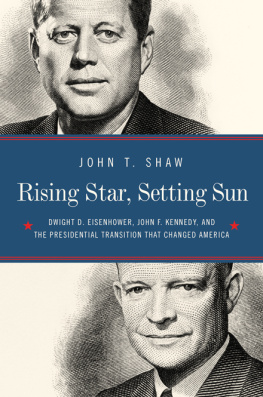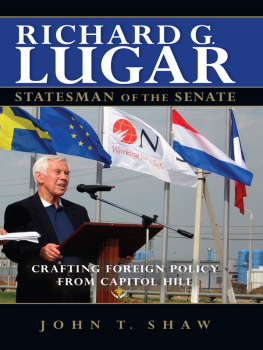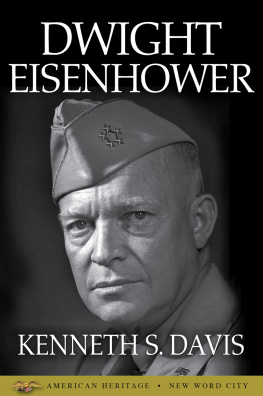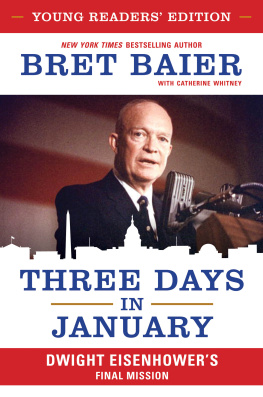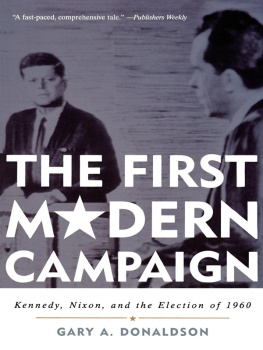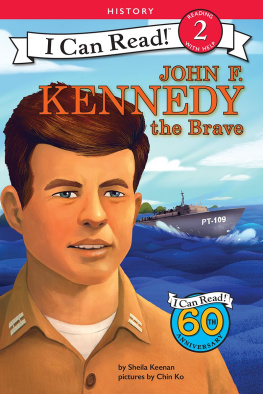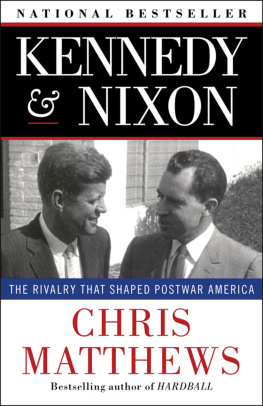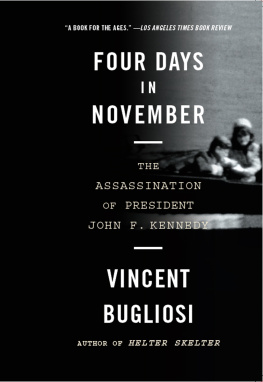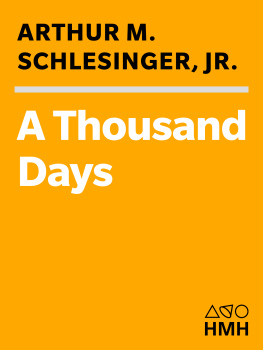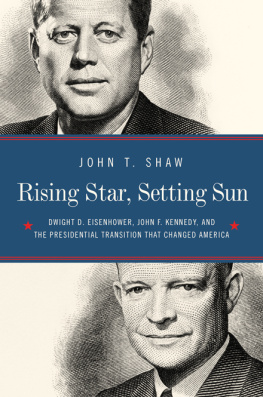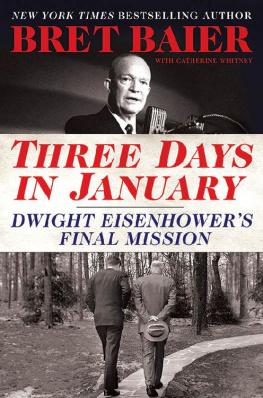
D wight D. Eisenhower and John F. Kennedy were fascinating and consequential leaders. It has been a pleasure and a privilege to study them through the prism of the ten-week transition between Kennedys election as president on November 8, 1960 and his inauguration on January 20, 1961.
While I have been aided by excellent biographies and narratives, this book relies heavily on primary sources: memoirs, oral histories, contemporary newspaper and magazine articles, and thousands of pages of documents that were generated by the outgoing Eisenhower administration and the incoming Kennedy government. My quest to piece together this story was aided by many skilled and generous people.
The John F. Kennedy Presidential Library in Boston is a remarkable repository for insight into the career of JFK. I am grateful to the staff for their assistance during my visits there. My particular thanks to Stacey Chandler for her good-humored help navigating the archives. Maryrose Grossman, from the Kennedy Librarys audiovisual section, was gracious and resourceful as she and her team tracked down dozens of photos from the transition for me to review.
The Dwight D. Eisenhower Presidential Library in Abilene, Kansas is, likewise, an extraordinary institution whose resources I relied on. I am grateful to the Eisenhower Foundation Abilene Travel Grants program which awarded me a grant that allowed me to work at the Library and take in the ambiance of Ikes hometown. Thank you to Kevin Bailey and Tim Rives for help navigating the collection. My gratitude also to Kathy Struss, from the Librarys audiovisual department, for assembling photos taken during the transition. My sincere thanks to researcher Sydney Soderberg not only for her tenacity in tracking down documents at the Library but also for inviting me to her home for a wonderful family dinner.
The staff of the U.S. Senate Library was immensely helpful throughout this project. Thanks to Nancy Kervin and Tamara Elliott for their creative and dogged efforts to track down contemporary accounts of this time. Samantha Yeider, in the U.S. Senate Daily Press Gallery, was constantly helpful and cheerful.
My profound thanks go to three people who read the entire first draft of the manuscript and offered perceptive, penetrating, and invaluable advice: Richard Cohen, editor of The Almanac of American Politics, Betty Koed, the U.S. Senate Historian, and Ray Mayfield, a former executive in the federal government and private sector. Their comments and questions made this a better book.
My two-decade association with the Washington Diplomat magazine has been one of the joys of my professional life and I remain grateful to publisher, Victor Shiblie, and managing editor, Anna Gawel.
While working on the final edits of this book I was given the immense privilege of becoming the director of the Paul Simon Public Policy Institute at Southern Illinois University. I look forward to a long and fruitful career here in Carbondale. America and the world need more leaders like Paul Simon and more universities like SIU.
Jonathan Lyons, my steadfast and supportive agent, believed in this project from the start and found a wonderful home for it at Pegasus Books. My sincere thanks to him, and to Jessica Case, Deputy Publisher at Pegasus, for her exuberance, attentiveness, and boundless energy.
Special thanks are due my family for their support and good humor: my parents, Joe and Terri Shaw, my brothers Dave and Tim Shaw, and my sisters Susan Moller, Pam Mueller, and Marybeth Sheehan.
Much of this book was written in a cottage in Tilghman Island on Marylands Eastern Shore. Heartfelt thanks to our hosts, first Ray and Jane Mayfield, and then Brenda and Norm Johanson, for their kindness in allowing me and my wife to share their spectacular view of the beautiful Chesapeake Bay. Few places in the world are as inspiring and calming.
This book would not have been possible, or worth doing, were it not for the support of my wife, Mindy Steinman. She sharpened my language, offered creative suggestions, asked penetrating questions, bolstered me during moments of weariness, and shared my passion for rendering this signal moment in American history. And then she packed up our house in Washington and organized our move to Carbondale.
RISING STAR, SETTING SUN
Pegasus Books Ltd.
148 W 37th Street, 13th Floor
New York, NY 10018
Copyright 2018 by John T. Shaw
First Pegasus Books cloth edition May 2018
Interior design by Maria Fernandez
All rights reserved. No part of this book may be reproduced in whole or in part without written permission from the publisher, except by reviewers who may quote brief excerpts in connection with a review in a newspaper, magazine, or electronic publication; nor may any part of this book be reproduced, stored in a retrieval system, or transmitted in any form or by any means electronic, mechanical, photocopying, recording, or other, without written permission from the publisher.
Library of Congress Cataloging-in-Publication Data is available.
ISBN: 978-1-68177-732-0
ISBN: 978-1-68177-809-9 (e-book)
Distributed by W. W. Norton & Company
www.pegasusbooks.us
For Mindy
MAIN BOOKS CONSULTED
Adams, Sherman, Firsthand Report: The Story of the Eisenhower Administration. New York: Harper & Brothers, 1961.
Alsop, Joseph W., with Adam Platt, I Have Seen The Best of It: Memoirs. Mount Jackson, VA: Axios Press, 1992.
Ball, George, The Past Has Another Pattern: Memoirs. New York: W.W. Norton, 1982.
Beschloss, Michael, Introduction and Annotations. Jacqueline Kennedy: Historic Conversations on Life with John F. Kennedy. New York: Hyperion, 2011.
Bishop, Jim, A Day in the Life of President Kennedy. New York: Bantam Book, 1964.
Bradlee, Benjamin, Conservations with Kennedy. New York: W.W. Norton & Company, 1975.
Bradlee, Benjamin, A Good Life: Newspapering and Other Adventures. New York: Simon & Schuster, 1995.
Brauer, Carl, Presidential Transitions: Eisenhower Through Reagan. New York: Oxford University Press, 1986.
Brownell, Herbert, with John P. Burke, Advising Ike: The Memoirs of Attorney General Herbert Brownell. Lawrence, KS: University Press of Kansas, 1993.
Burns, James MacGregor. John F. Kennedy: A Political Profile. New York: Brace & World, 1961.
Campbell, Kurt, and James Steinberg, Difficult Transitions: Foreign Policy Troubles at the Outset of Presidential Power. Washington: Brookings Institution Press, 2008.
Clarke, Thurston, Ask Not: The Inauguration of John F. Kennedy and the Speech That Changed America. New York: Henry Holt and Company, 2004.
Cohen, Andrew, Two Days in June: John F. Kennedy and the 48 Hours That Made History. New York: Penguin Random House, 2014.
Dallek, Robert, Camelots Court: Inside the Kennedy White House. New York: HarperCollins, 2013.
Dallek, Robert, An Unfinished Life: John F. Kennedy, 19171963. Boston: Little, Brown, 2003.
Divine, Robert, Foreign Policy and U.S. Presidential Elections, 19521960. New York: New Viewpoints, 1974.
Donaldson, Gary A., The First Modern Campaign: Kennedy, Nixon, and the Election of 1960. New York: Rowman & Littlefield, 2007.
Donovan, Robert, Confidential Secretary: Ann Whitmans 20 Years with Eisenhower and Rockefeller. New York: E.P. Dutton, 1998.
Donovan, Robert, Eisenhower: The Inside Story. New York: Harper & Brothers, 1956.
Drury, Allen, Advise And Consent. New York: Doubleday, 1959.
Next page
